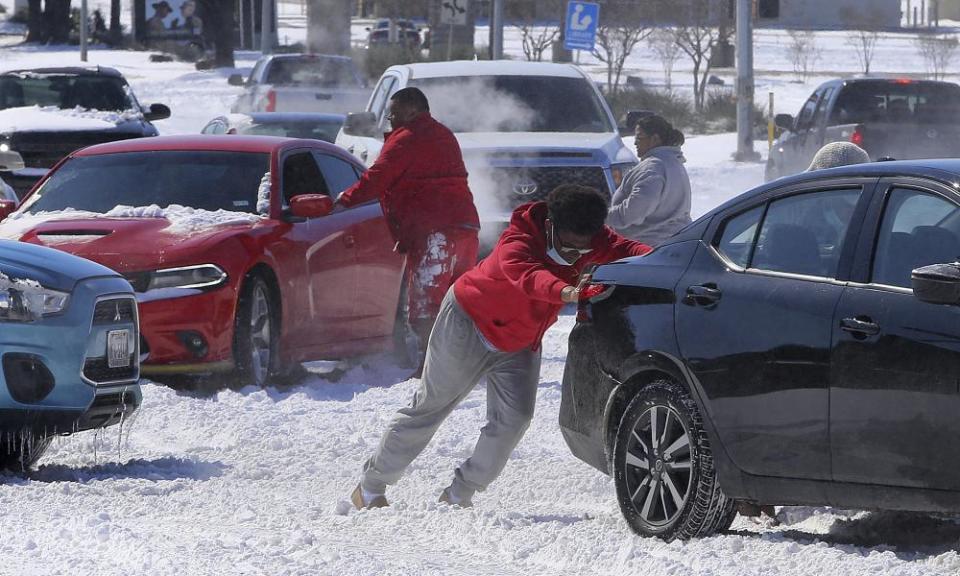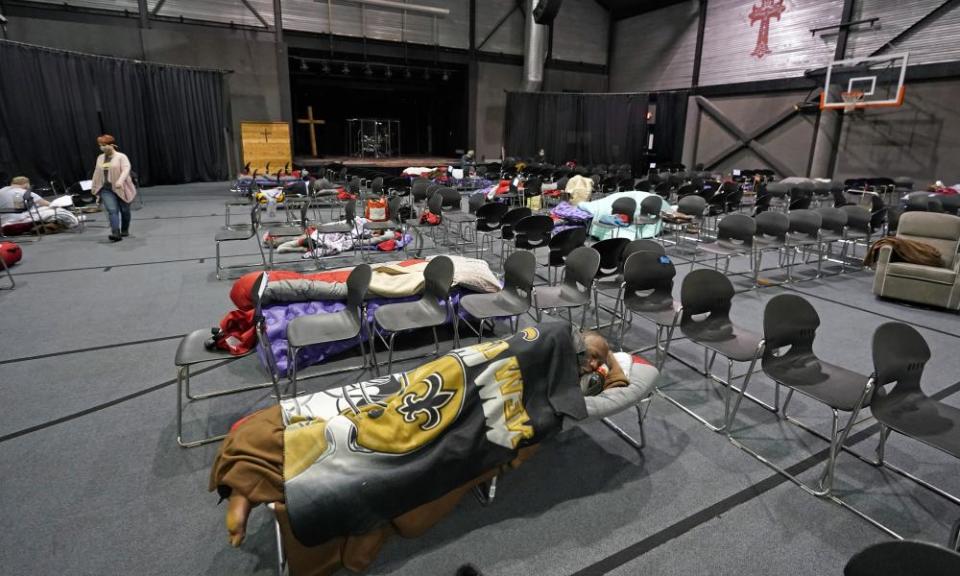Millions without power and 21 dead as ferocious winter weather sweeps US
Ferocious winter weather sweeping across large parts of the central and southern US has brought record-breaking cold temperatures, left millions without power and killed at least 21 people across multiple states.
The worst power outages were in Texas, where more than 4m homes and businesses remained without power on Tuesday in subfreezing temperatures. Elsewhere more than 250,000 people also lost power across parts of Appalachia, and 4 million people lost power in Mexico. Another quarter-million were without electricity following an ice storm in north-west Oregon.
In North Carolina, three people were found dead after a tornado hit a seaside town, while in Texas, four family members perished in a Houston-area house fire while using a fireplace to stay warm. Others deaths occurred in states such as Louisiana, Kentucky and Missouri, from causes that included car crashes and carbon monoxide poisoning.
The storms overwhelmed power grids and immobilized the southern plains, carried heavy snow and freezing rain into New England and the deep south, and brought painfully low temperatures. Wind-chill warnings extended from Canada into Mexico. In Chicago, a foot and a half (46cm) of new snow forced public schools to cancel in-person classes for Tuesday. Snow even reached the normally balmy coastline of the Gulf of Mexico.
Related: Frigid temperatures grip Texas – in pictures
Storms dumped snow and ice from Ohio to the Rio Grande through the long Presidents Day holiday weekend, and treacherous weather was expected to grip much of the United States through Friday. Forecasters predicted up to 4in of snow and freezing rain from the southern plains into the north-east.
The weather also threatened to affect the nation’s Covid-19 vaccination effort. Joe Biden’s administration said delays in vaccine shipments and deliveries were likely.
Officials in Texas have faced criticism as the state energy grid repeatedly failed, forcing rolling blackouts. As utilities attempted to restore power to homes that lacked it while offices in downtown Houston remained lit up, the Harris county judge Lina Hidalgo, the top elected official in the city, told the Guardian: “History is going to remember who did their part and who didn’t.”
Many Texans were struggling, most in houses not built to retain heat. In Austin, Matthew Micik had gone 24 hours without power, the temperature in his house below 35F (1.6C). After finding a hotel room in nearby San Marcos, he drove through ice and sleet only to find most of that town had lost power too. He spent the night in his car.
From Galveston, Jessica Knofla said: “Basically, everyone who lives here had no warning and is stuck on a blacked-out island with no major stores open and no lights on the road. It’s absolutely infuriating and I’m fucking pissed.”
Related: At least three people killed after tornado hits overnight in North Carolina
Many did not have water because of frozen or burst pipes. Kelsey Muñoz, an intensive care nurse in Dallas, said: “Currently, I have power and I’m hoping I am not jinxing myself by saying that. However, for water I’ve had to gather snow and melt it. Never thought I had to do that in Texas.”
The blackouts forced Harris county to scramble to get more than 8,000 doses of Moderna’s coronavirus vaccine into people’s arms, after the county public health facility lost power and its back-up generator also failed. Officials distributed the doses at three hospitals, Rice University and the county jail. Hidalgo said she didn’t believe any vaccines were lost.
The conditions also delayed vaccine shipments. State officials said Texas, due to receive more than 400,000 doses this week, did not expect deliveries until at least Wednesday.

The Southwest Power Pool, a group of utilities across 14 states, called for rolling outages because reserves were exhausted. Some utilities said they were starting blackouts, while others urged customers to reduce power usage. State officials said surging demand was driven by people trying to keep homes warm.
In a phone interview, Hidalgo told the Guardian: “We’re facing all kinds of frustrating situations. We’re asking folks to conserve energy. At last count, 1.37 million people in our region are without power. The other 3 [to] 4 million are conserving power to protect more from having to being cut. Then you have the buildings downtown lit up.”
Harris county covers Houston, where outrage spread over office buildings and others in the city center that still had power.
“We noticed those from the emergency operations center last night,” Hidalgo said. “We called around asking those leaders to take the power down. Some of them did around 11 [to] midnight. Some of them didn’t. It just tells you everybody has to do their part. And as I’ve been stressing to my community today, that’s not just the individuals. That’s the businesses. History is going to remember who did their part and who didn’t do their part.”
Hidalgo said the electricity provider CenterPoint had “figured out a way to actually cut the electricity from those buildings, which they couldn’t do last night because there’s critical infrastructure going through downtown. They’re doing that today throughout the day. It’s not something people needed with already the tragedy and the nightmare that has unfolded with more than 24 hours without power for other people.”

Authorities in multiple states reported deaths in crashes on icy roads. Deaths in Texas included a woman and a girl from suspected carbon monoxide poisoning in Houston, from a car running in a garage at a home without electricity, police said. Law enforcement said temperatures were probably to blame for the deaths of two men on Houston-area roads.
“The number one challenge is the nightmare of the power being out,” Hidalgo said. “Many, if not most, of the first responders here with me at the emergency operations center have families back home that are having to also face no power and no water many times. We understand just how terrible this situation is.
“The second challenge after the power issue is the carbon monoxide poisoning. We’ve seen at least 50 incidents so far in the county as of this morning, but our fire marshal tells us that’s just the tip of the iceberg. If you need to be in your car to warm up, that’s fine but you’ve got to do it outside.”
Elderly and homeless people were most vulnerable. Cities implemented “emergency warming centers” but it was not clear how they could follow Covid-19 safety protocols. More than 500 people were at one shelter in Houston but the mayor, Sylvester Turner, said others had to be shut because they lost power.

The San Antonio transportation authority suspended service and deployed supervisors to look for homeless people who needed a ride to a warming center. Alex Fleming, a pastor, had been volunteering at San Antonio’s First Baptist church, an emergency warming center. Capacity is 45. As of Monday night, he said, they had sheltered 26 people.
“I think we would be at capacity because each day it kept growing. A lot of places are getting overpacked,” Fleming said. “The only hard [thing] is that you can only take so many. You’ve got to turn people away sometimes.”
In west Tennessee, a 10-year-old boy died after falling into an ice-covered pond on Sunday, fire officials said.
Several cities had record lows: in Minnesota, the Hibbing/Chisholm weather station registered -38F (-39C). Sioux Falls, South Dakota, dropped to -26F (-32C).
Air travel was also affected. At midday, more than 2,700 US flights had been canceled, led by more than 800 at Dallas Fort Worth international airport and more than 700 at Bush Intercontinental in Houston.
Authorities pleaded with residents to stay home on Tuesday. About 100 school systems closed, delayed opening or switched to remote classes in Alabama, where forecasters said conditions might not improve until temperatures rise above freezing on Wednesday afternoon.
Reuters and the Associated Press contributed reporting

